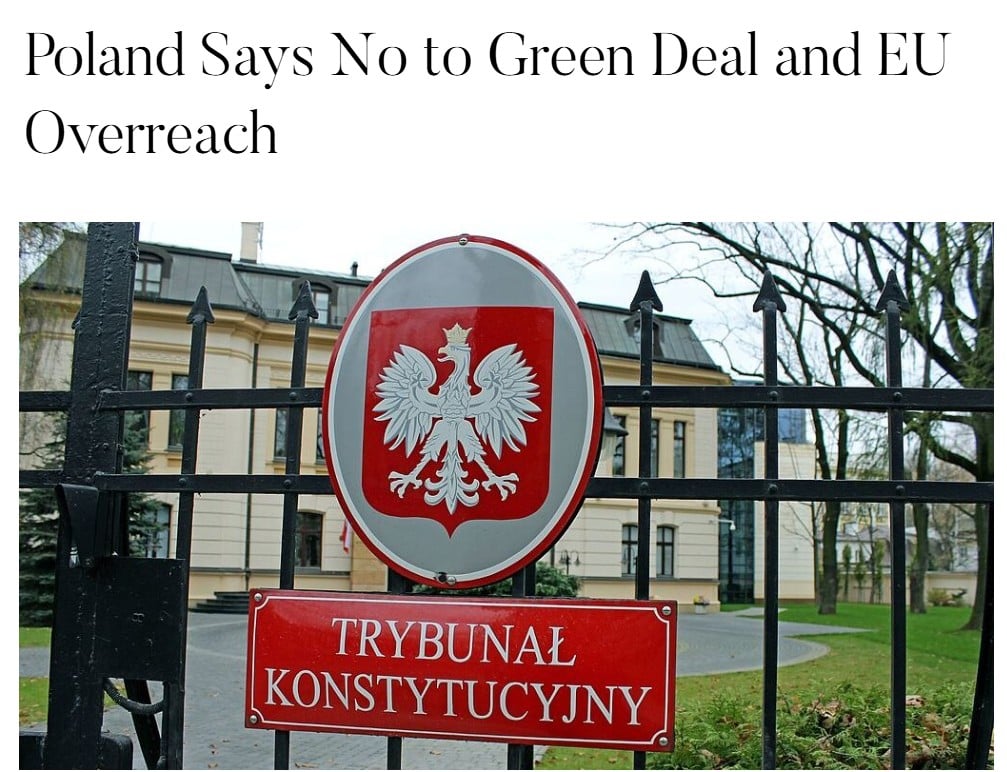Fact-check | Has Poland declared the end of the Green Deal?
Despite the sensational headlines and political interpretations, the Constitutional Court's decision concerns something very specific

In recent days, a number of international media outlets have reported that Poland is abandoning the European Union's Green Deal. These claims are based on the country's Constitutional Court's ruling on European decision-making policies.
Misleading headlines such as “Poland says ‘no’ to the Green Deal and the EU's overreach” in publications such as European Conservative, as well as those in Bulgarian media: “Poland declares the EU's Green Deal unconstitutional” (Lentata by Karbovski) are misleading, creating a false or distorted impression of the content. They deliberately or unintentionally suggest something that is not supported by the facts in the text and exaggerate, taking information out of context or distorting its meaning.

What did the court rule?
The Polish Constitutional Court ruled that part of the European Union's climate policy legislation—including the adoption of key mechanisms such as the Emissions Trading Scheme (EU ETS)—is inconsistent with the Polish Constitution. The decision caused political turmoil in the country and opened a serious debate on the future of the Green Deal in Poland.
In its ruling of June 10, 2025, the court stated that the way in which the EU implements its climate policy exceeds the powers conferred on it by the European treaties. In particular, it challenges the use of qualified majority voting in the EU Council for decisions affecting national energy policy, which, according to the court, should be subject to unanimity and national ratification as it directly affects Poland's sovereignty.
The main focus of the challenge is Directive 2003/87, which is the basis for the EU ETS—the market mechanism for trading carbon emissions that the EU uses to achieve climate neutrality by 2050.
What's being violated?
Specifically, the decision covers the EU Emissions Trading System (EU ETS) in its part relating to the construction sector (buildings), road transport, and the impact on the national energy mix. It should be noted that ETS 2 will enter into force in 2027 and will cover emissions from heating buildings and fuel for cars.
According to the court, the EU failed to comply with the unanimity requirement by adopting the extension of the EU ETS to buildings and transport by a qualified majority, even though this affects Poland's energy mix (e.g., the use of coal, gas, and district heating).
The court considers that this violates Article 90 of the Polish Constitution, which states that the transfer of sovereign powers to international institutions must be subject to ratification by a two-thirds majority of the parliament or a national referendum.
The use of qualified majority voting (QMV) in the EU Council for decisions on energy policy, especially when they affect the energy mix of Member States, is a sensitive and complex issue in EU law.
Article 192 of the TFEU (Treaty on the Functioning of the EU) allows the EU to adopt measures in the field of the environment by qualified majority in the Council. However, there is an exception (Article 192(2)(c)):
...for measures significantly affecting the choice of energy sources and the overall energy supply of a Member State, the Council shall act unanimously.
In other words, normal environmental policies can be adopted by QMV, but when the measure interferes with the choice of energy sources, it must be adopted unanimously.
Is this a decision against the European Green Deal? No. It is about the decision-making procedure, not the climate goals," writes expert and former environment minister Julian Popov in a Facebook comment.
Does it have legal force?
Despite the sensational headlines and political interpretations, the decision is not yet legally binding. The reason: the government has not published the decision in the State Gazette, which is a prerequisite for its implementation.
This comes as no surprise. Donald Tusk's cabinet disputes the legitimacy of the current composition of the Constitutional Court, as some of the judges were appointed under controversial circumstances. This creates a paradoxical situation: the court rules on something with potentially far-reaching consequences, but the government refuses to implement it.
Nevertheless, the decision creates legal uncertainty. Future court cases brought by Polish companies or institutions based on this decision could call into question parts of EU climate legislation in the country – especially after 2027, when the scope of the ETS (ETS 2) will be expanded to include buildings and road transport.
Is this the end of the Green Deal for Poland?
Will it cancel or delay the Green Deal? No, it won't. The Green Deal isn't just one law, but a broad strategy covering industry, agriculture, innovation, and finance," Popov explains.
According to him, this court decision will be loudly used by nationalist and pro-Russian media as a blow to the “dictates of Brussels” and renewable energy.
Kaloyan Staykov, chairman of the Energy Management Institute, also commented on the issue on social media, explaining that the decision is indeed important, but it concerns something very specific – the European carbon emissions trading scheme. “Of course, it is far from perfect and is more of a work in progress, but we have yet to see what the effect of this decision will be.”
One thing is certain – this is not the end of the Green Deal, which is, above all, an investment plan and a strategy for economic growth. It is a completely separate question whether such an approach is reasonable in theory and/or in practice," adds Staykov.
Co-Funded by the European Union. Views and opinions expressed are however those of the author(s) only and do not necessarily reflect those of the European Union or the Managing Authority. Neither the European Union nor the Managing Authority can be held responsible for them.
Translated with DeepL.


 Aleksandra Sotirova-Delcheva
Aleksandra Sotirova-Delcheva